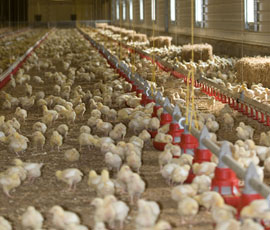Morrisons develops wet litter guide for poultry producers

Supermarket group Morrisons has developed a new information pack aimed at helping poultry producers tackle the impact of wet litter on bird health and performance.
Problems associated with litter quality have been a major factor for many poultry farmers supplying Morrisons.
“Debate on how to tackle problems associated with wet litter tends to dominate our producer group meetings and it was obvious there was a desire to find out what was happening elsewhere in the world, to see if we could copy best practice,” said agriculture manager Louise Welsh.
“We worked with experts to examine global developments in improving litter quality and then pulled together the key points in an easy-to-use information pack. The main feature is a farmer-friendly factsheet that can be pinned up or even loaded onto a computer and used on farm.”
The information pack notes that litter moisture can be affected by a number of environmental factors, including drinker design, air change rate, condensation, litter material and depth, stocking density, diet and flock health.
“We worked with experts to examine global developments in improving litter quality and then pulled together the key points in an easy-to-use information pack. The main feature is a farmer-friendly factsheet that can be pinned up or even loaded onto a computer and used on farm.”
Louise Welsh, Morrisons
“Effective ventilation is crucial to keeping litter dry and evenly distributing heat, as well as cooling birds,” said a spokesman.
“Evaporative cooling systems, such as misters and foggers, are increasingly being used to increase humidity, reduce dust and lower air temperature. These have been proven to improve feed utilisation and growth. But increased air humidity must be suitably managed or it can reduce litter quality and increase ammonia levels.”
Morrisons says it is committed to working with poultry suppliers to help improve both efficiency and bird welfare. All Morrisons standard chicken now comes from farms raising birds with natural daylight and access to perches and pecking objects to stimulate activity.
For more wet litter advice, see our recent report from the South West Chicken Association conference
